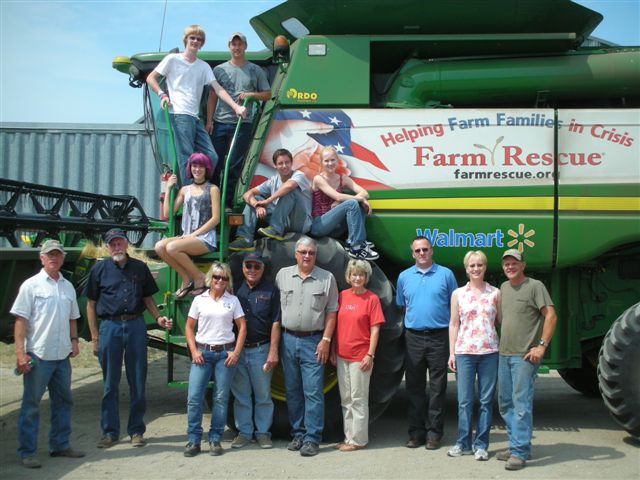The nomination period for the 2013 county committee elections opens on Monday, June 17. The nomination period — which runs through Aug. 1 — allows farmers and ranchers to select themselves or others as candidates to sit on the local county committee and help make important agricultural decisions. Members of the committee deliver FSA farm programs at the local level and make decisions needed to administer the programs in their counties. Learn more about the county committee elections, download an online application in English or Spanish.
County Committee Nomination Period Opens Monday, June 17
Applications Sought for Grants to Support Small, Socially Disadvantaged Producers
USDA is seeking applications from cooperatives to provide technical assistance to small and socially disadvantage agricultural producers in rural areas. Grants up to $200,000 will be awarded by the USDA Rural Development’s Small, Socially Disadvantaged Producer Grant program to jump start small business hiring and help producers get the tools needed to succeed. The deadline to apply is July 10 for electronic applications and July 15 for paper applications. Learn more.
Landowner Gets Even After Beetles Destroy 10,000 Trees
Larry Lipson found a way to get back at the mountain pine beetles that descended on his ranch and killed 10,000 trees. He made them accessories. The mountain pine beetle can attack a tree like a pack of dogs attacking an elk, according to the U.S. Forest Service. Lipson wasn’t going to let them destroy his 37,000 acres of land. After isolating and controlling the beetles, he decided not to burn the wood. Instead, he sent the wood to a mill for processing. What came back was a blue-stained wood that Lipson uses to create tech accessories for Apple products. Lipson hopes his sustainable practices will raise awareness about the pine beetle infestation. Read more (New York Times).
N.D. FSA Employees Volunteer to Aid Injured Farmers

Farm Service Agency staff members from North Dakota have made it their goal to volunteer their time, service and money to help farmers in need. For several years, staff members have volunteered with Farm Rescue, an organization that provides planting and harvesting assistance to farm families that have experienced a major injury, illness or natural disaster. FSA employees provide lunches to workers and emotional support to the families.
Laotian Farmer Becomes National Voice for N.C. Hmong Community

Maykia Yang (right), is trying to educate Hmong farmers in North Carolina about Farm Service Agency programs. Pictured with Maykia is her husband Jim (left) and son Marcus.
By Eddie Woodhouse, Public Affairs Specialist, N.C. Farm Service Agency
It’s not a pleasant memory for Maykia Yang. Fleeing on foot from her native home of Laos at age eight and following her family to Thailand where she spent two years in a refugee camp.
“My father was a soldier and worked for the CIA during the [Vietnam] war. After the CIA pulled out, the Vietnamese took over Laos and we fled on foot for about a month,” said Yang, who now owns a chicken farm in North Carolina.
It was the challenges in her path that led her to become an accomplished farmer, but it was her willingness to help others that made her become a voice for minority farmers in her state. Her success prompted Agriculture Secretary Tom Vilsack to appoint her as a voting county committee member for the Moore County FSA office in North Carolina and she was also selected to serve on the USDA Beginning Farmers and Ranchers advisory committee. Continue reading
Celebrating Diversity
 The California Farm Service Agency celebrated Asian American and Pacific Islander Heritage Month with delicious ethnic foods, video recordings, traditional dancing, personal stories from staff members of their family heritage and a fashion show. An Asian/Pacific Island market of traditional fruits, vegetables and other products were on display with nutritional information and recipes. –By Joanne Fong, Assistant to the CA State Director. CA
The California Farm Service Agency celebrated Asian American and Pacific Islander Heritage Month with delicious ethnic foods, video recordings, traditional dancing, personal stories from staff members of their family heritage and a fashion show. An Asian/Pacific Island market of traditional fruits, vegetables and other products were on display with nutritional information and recipes. –By Joanne Fong, Assistant to the CA State Director. CA
The USDA Farmers Market is Officially Open

Acting Deputy Secretary Michael Scuse took off his jacket and put on his hat to gear up for the 18th annual USDA Farmers Market.
Tropical Storm Andrea didn’t wash out the official opening of the USDA Farmers Market on Friday as more than 200 people gathered inside the Whitten Building to witness the ringing of the bell. This year marks the 18th season of the USDA Farmers Market that will hosts 13 vendors from Maryland, Virginia and Washington, D.C. “This farmers market helps meet the growing demand for fresh food and provides smaller producers an opportunity to have an additional source of income,” said acting Deputy Secretary of Agriculture Michael Scuse. Continue reading
One Week Left to Sign Up for CRP
Only a week remains for producers to sign up for the 45th general Conservation Reserve Program. Producers can sign up by June 14 to receive cost-share assistance to plant long-term, resource-conserving covers and receive annual rental payment for the length of the contract, which is 10-15 years. For the past 27 years, CRP has become one of the largest conservation effort with 27 million acres enrolled in the program. Those acres have improved water and air quality, prevented soil erosion and increased populations of pheasants, quail, ducks and rare species like the sage grouse and lesser prairie chicken. Those interested should contact their local FSA county office to sign up. Learn more or locate a county office
Friday is Last Day to Apply for SURE Assistance
Producers have until Friday, June 7, to apply for the Supplemental Revenue Assistance Payments (SURE) program for 2011 crop losses. The program provides crop disaster assistance payments to eligible producers on farms that have incurred crop production or quality losses. Producers should visit a local Farm Service Agency county office to apply. Learn more or find a local county office.
Federal Employees Can Donate Leave to Tornado Victims
The Office of Personnel Management has established an emergency program to allow the transfer of unused annual leave to be donated to employees in the same agency or in another agency. Under an executive order by President Obama, the emergency leave transfer program will allow federal employees to donate leave to those in Oklahoma and other states hit by natural disasters. The donated leave allows victims take off from work without having to use all of their paid leave. Read more (Government Executive).





